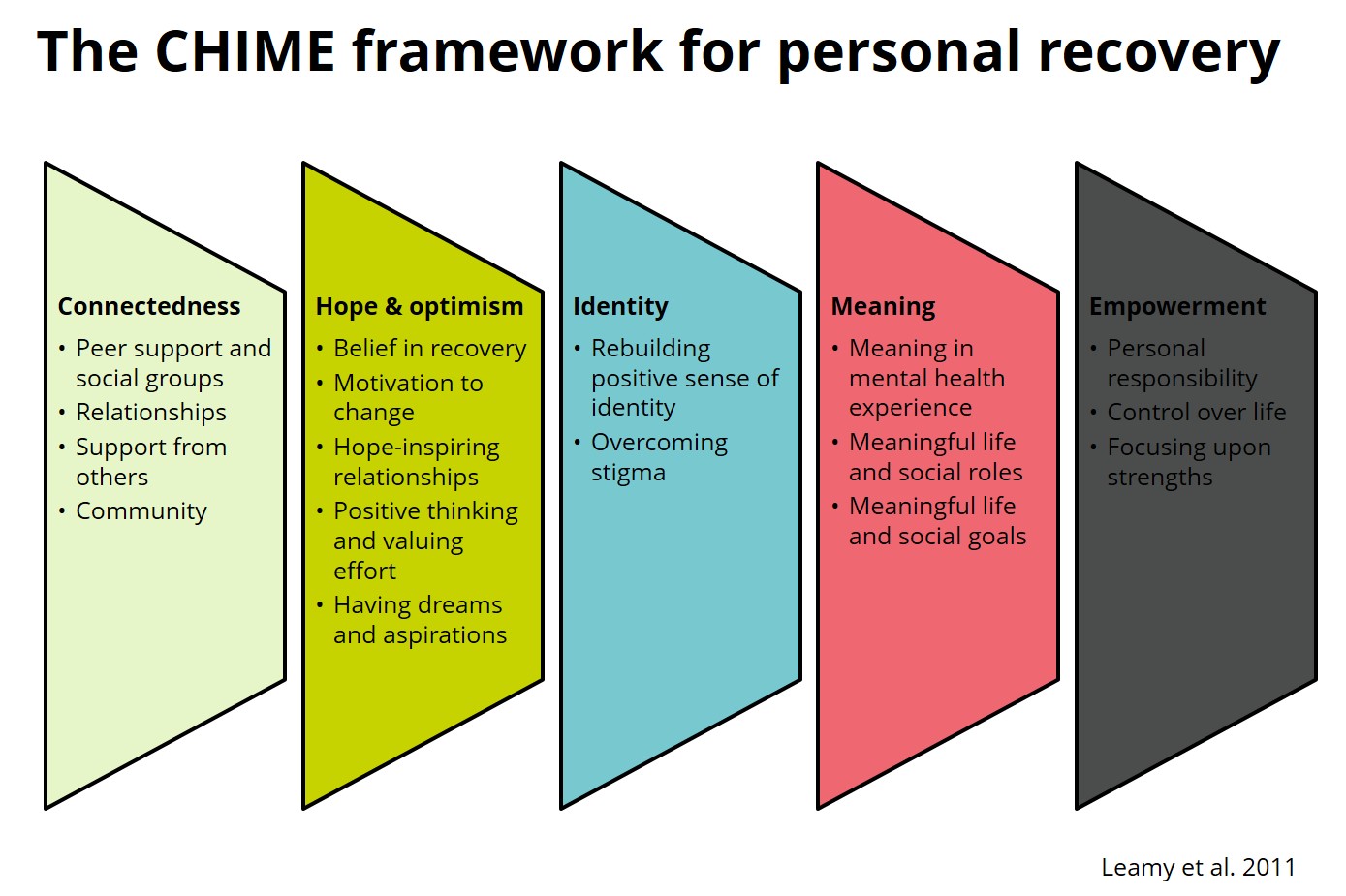Last month, I attended the Loneliness and Social Isolation Mental Health Research Network (LSIMHRN) seminar (where big brains prioritize research over catchy acronyms) and kept hearing about the CHIME model—finally, a concept with both research and communication appeal.
The CHIME framework was developed by Leamy et al through a systematic review and narrative synthesis of 97 papers which looked at narratives of personal recovery. The review looked at the common elements, and out of that came the framework below.
When I come across concepts which are new to me, I’m often thinking about them from different perspectives:
- As a person who has experienced some not great mental health in my teens and twenties, how would this help me?
- As a former policy maker, what are the policy implications of this? How can this concept better inform how we support people who need it?
- As a therapist, how might clients find this useful?
What I like about the framework is that it combines some of the ways inner processes change as people recover, with some of the important social aspects ie. how we connect with people, and the meaningful social roles we have. I recognise some of the changes it describes in my own internal and external processes over the past few decades, including the shift from feeling like things happened to me, to becoming more aware and confident in my own autonomy and agency, and more able to think about the future.
However, I also think that if I was shown this slide when I was feeling particularly shitty about myself, I’m not sure I would find it that helpful. How can you find hope and autonomy when you don’t feel it? When I’ve struggled with mental health in the past, that’s when its been hardest to open myself up for connection with others. I think this partly speaks to the fact that this is a model for describing changes as recovery happens, it’s not necessarily a roadmap for recovery.
This model isn’t for thinking about recovery from loneliness specifically, but for mental health journeys more broadly. However, it prompts me to think about whether there is anything we can take from it in thinking about how we work with changes people want to make in their lives. I’m struck by the focus on connection, and ways in which it can be easier to offer spaces for people to do that. One of the impacts of austerity and the shrinking of the state and local government in the last 15 years is that there is less funding for social and communal spaces and for social and communal activities. I think that has also reduced the opportunities for people with weak social ties to meet new people. I’ve also been thinking recently about the idea of groups, particularly recovery/therapy/mental health groups, and the potential benefits of being part of a cohort of people going through something together. Ultimately, people’s social needs are diverse, and as a society we need to offer different ways of people coming together for communal purposes.
I’m in the process of reading The Maps We Carry by Rose Cartright (there is a free to read excerpt of the book here). It’s a critique of the framework we have for mental health which focuses on diagnoses and overlooks both the internal experience of mental illness and the social context in which it occurs. Her background in marketing also means she is cutting about the integration of capitalism and mental health, the role of influencers, mental health apps etc. However, I was thinking about the CHIME model as I read her book. She speaks a lot about the importance of connection and the lack of places we have for communal activity, singing together, dancing together, crossing thresholds together. The importance of having experiences with and alongside other people, of finding ways of doing things together and being present with one another. This really speaks to me, and I’m a person for whom a lot of this does not come naturally. Unlike Rose, I’m not the sort of person who can manage a rave…
References
Leamy M, Bird V, Boutillier CL, Williams J, Slade M. Conceptual framework for personal recovery in mental health: systematic review and narrative synthesis. British Journal of Psychiatry. 2011;199(6):445-452. doi:10.1192/bjp.bp.110.083733
